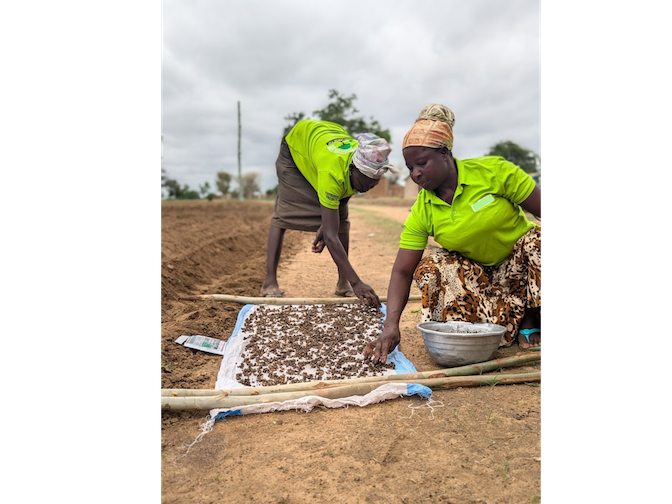Nuru Ghana addresses poverty by delivering critical weather information
Nuru Ghana launched earlier this year in the Upper East Region of the country to address extreme poverty. It began in a way that may seem unconventional–delivering critical weather information technology to 1,000 farmers. Digital weather prediction services are a highly-effective and resource-efficient tool that Nuru can leverage to build trust and strengthen relationships with communities. As rural entrepreneurs gain access to a service that provides them with an immediate benefit, Nuru Ghana is simultaneously using this time to further understand local strengths, challenges, and opportunities for support.
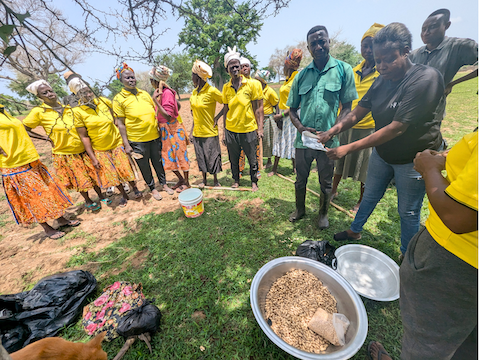
Nuru Ghana provides training to farmers, 2024
Critical Weather Information Technology – Difficult to Access in West Africa Amid Poverty
Rural livelihoods are dependent on and heavily impacted by weather patterns. Weather patterns determine everything from when to plant, when to add compost to the soil, and when to plan for extreme weather events that can impact both livestock and crops. For rural entrepreneurs facing extreme poverty, accurate weather information is a lifeline, but in much of West Africa, this modern convenience that many take for granted remains largely inaccessible.
As climate change continues to impact the globe, accurate and timely weather information becomes increasingly important, with erratic rainfall patterns triggering both droughts and floods (FAO). One farmer from a Nuru-supported agribusiness in Burkina Faso noted how significant weather changes have been in his lifetime, “When we were children, it rained enough. The rains started in May, and we planted at the end of May. By early June, everyone had sown. There were often pockets of drought, but not like now, and this had no impact on the crops. The land was fertile and didn’t need fertilizers to get good yields. Crops yielded well, and we filled the granaries, ate our fill, and sold to buy things we didn’t have.” He is not alone in his experience, as farmers in poverty across many countries in Africa are now more susceptible than ever to increasing weather shocks (WMO).
Nuru Ghana Delivers Critical Weather Information Via Ignitia Forecasting Technology
Nuru Ghana partners with ignitia to deliver hyperlocal weather information in the Upper East Region of Ghana, knowing that this weather information informs the various on-farm decisions made by farmers throughout the planting and growing season. Ignitia explains why available weather data used for weather forecasting in places like the US and Europe will not work in places like Ghana: “High-quality global climate forecast models are based on high- and mid-latitude geographies typical of the European and North American continents. And they are the ones who generate the weather forecasts, traditionally distributed around the world. The problem is that in tropical zones, such as West Africa, the climate does not work the same way as in high and mid-latitude geographies, which generates recurring errors, especially in rainfall forecasts (ignitia).” Inaccurate rainfall forecasts are not merely inconvenient for farmers, but rather they can represent the difference between a thriving harvest versus crop failure or increased income versus financial loss.
Since May, rural entrepreneurs have been utilizing ignitia weather forecasting services. SMS weather forecasts utilize technology to deliver forecasts straight to users’ phones. To support the use of this new technology, Nuru Ghana held training sessions with ignitia users. Training included how to interpret the forecast information, when to expect the messages, recommended actions based on forecasting, and visual support for low literacy users. Another vital part of the training included information on why the forecasting data can be trusted.
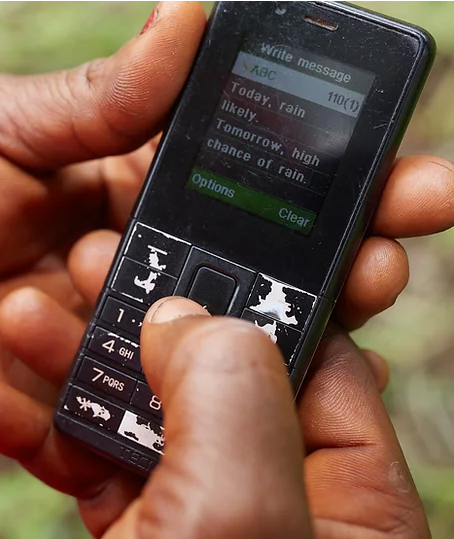
ignitia weather services being viewed on a mobile device. Photo credit: ignitia
Service Delivery Challenges In Ghana
Introducing a new digital technology into a rural community can come with its challenges, as users adjust to the technology and gauge its level of accuracy. In this region of Ghana, in particular, there are also existing and far less accurate forecasting services. Many rural communities also continue to rely on village elders to predict the weather. Local adoption of the service was further challenged by a general sense of distrust and skepticism of technology, services, and a new organization. Thousands of organizations have quickly emerged and dissolved in this area, leading to high levels of uncertainty in these communities. It has been important for Nuru Ghana to prove its commitment to the local community, slowly build trust, and provide consistent support for the use of ignitia.
Rural Farmer Entrepreneurs Provide Feedback on Technology
Despite initial skepticism, ignitia users quickly found value in ignitia. One user noted that she intended to plant millet, but waited because of the forecasted rain. This decision was important, as it rained for two days in the area and would have washed away the millet seeds had they been planted. Similarly, upon seeing the value of ignitia, another farmer noted, “If we had this in the year 2007 when we all lost our farms to flood, some people wouldn’t have died out of famine, and we could have at least known the rain pattern. Today, I am happy because I know when to sow, and when not to sow.”
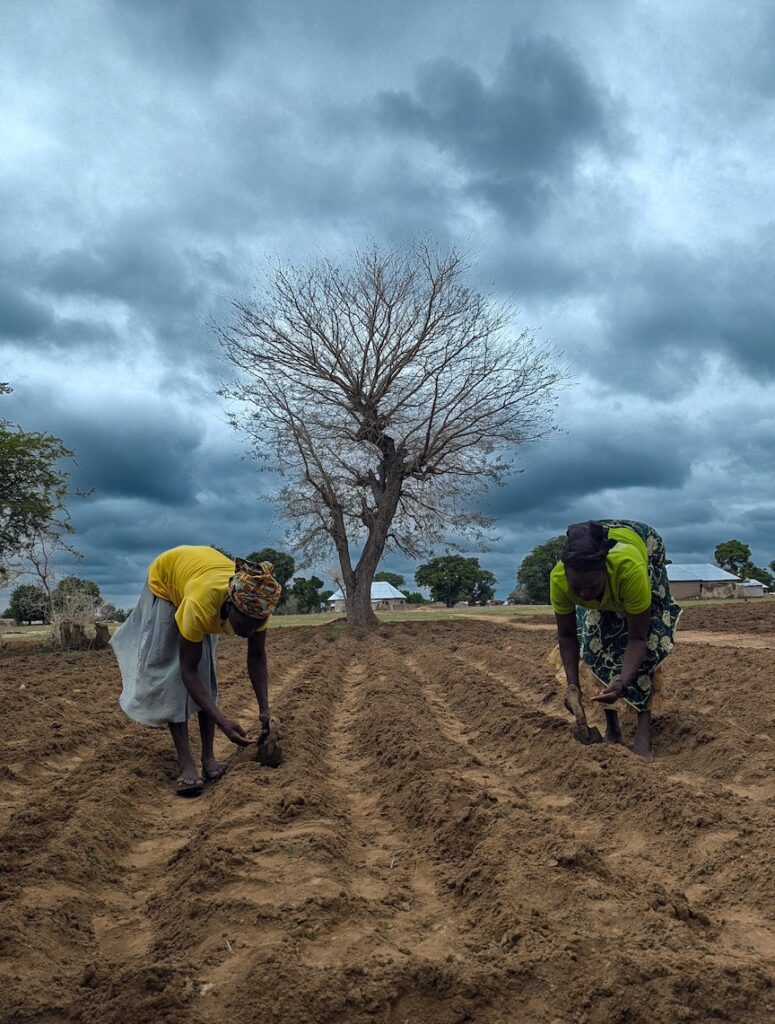
Nuru Ghana, Women farmers working under stormy skies, 2024
Another farmer shared, “I am happy when I hear the sound of the messages, I feel happy I am getting a piece of information regarding what I do for a living. I will follow the messages till the season comes to an end.” Increasing farmers’ confidence by removing the guesswork from rural livelihoods paves the way for quality decision-making that ultimately equips rural entrepreneurs to increase their crop yields, and subsequently increase their incomes. These increases contribute to both food security and household resilience, as families begin to break free of extreme poverty and begin building their prosperity.
Beyond Weather Technology: Next Steps in Addressing Poverty
Nuru prioritizes local adaptation. This means that initial work in a new community includes significant data collection and information gathering to determine how to best support the community and its future agribusinesses.
Later this year, Nuru Ghana will complete an initial baseline survey to compare individual farmers’ yields against those of the Nuru Ghana-established demonstration plots. Nuru Ghana uses demonstration plots to showcase climate-smart agriculture practices in action. As farmers are able to see successful harvests from these previously unfamiliar practices, they are open to shifting their own behaviors on their farms. Using data gathered from demonstration plots and individual farmers, Nuru Ghana will generate a comparison between potential future yields and those recorded before its interventions. Baseline surveys are a critical component of Nuru programs, as they establish concrete data for impact evaluation and equip Nuru Ghana to properly plan support services and inputs for the following planting season.
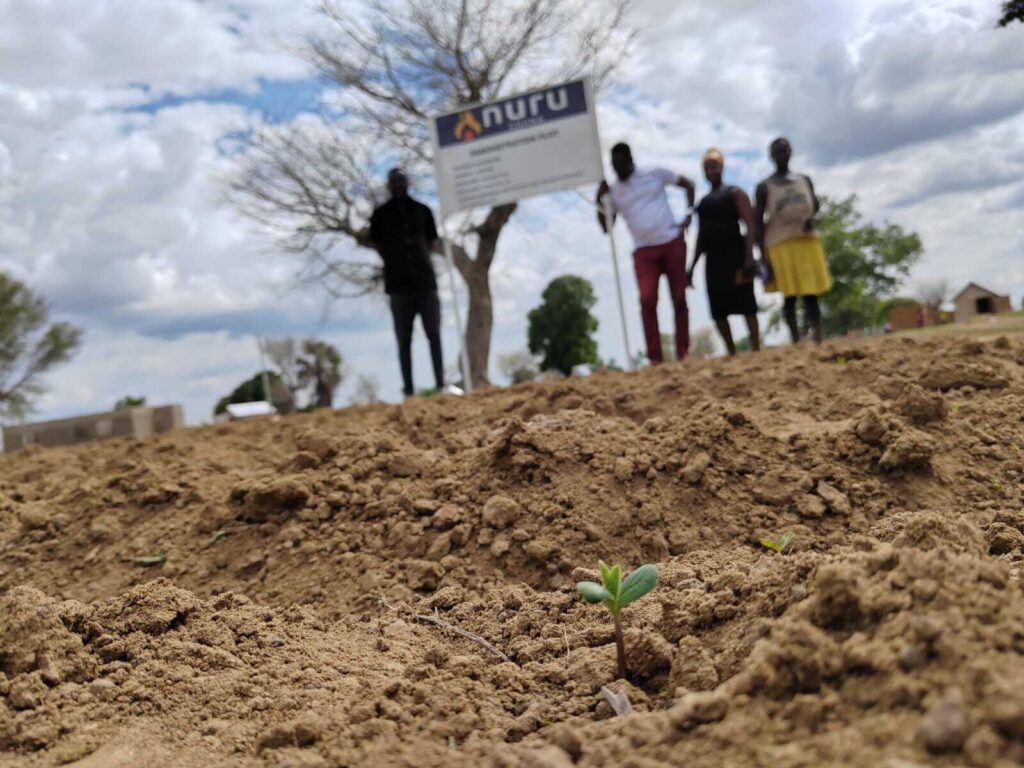
One of the first seedlings sprouts at Nuru Ghana demonstration plot, June 2024
Nuru Ghana is also preparing for 2025 by cultivating relationships with farmer groups, with the goal of supporting these groups to become professional, thriving agribusinesses that provide benefits to their farmer members. As part of this process, Nuru Ghana is designing its local curriculum and launching initial training for farmer group leaders, focusing on leadership principles. During this process, Nuru Ghana will also conduct SCOPEinsight Rapid tests with 10 farmer groups. These tests evaluate farmer groups on the following: internal and financial management, operation and production, and market. With this information, Nuru Ghana will more fully understand each farmer group’s opportunities for growth. To more fully understand how SCOPEinsight evaluations can be used, read about how Nuru Ethiopia has used SCOPEinsight.
Prioritizing Partnerships
Partnerships like ignitia and SCOPEinsight equip Nuru Ghana to meet farmers where they are, delivering support and services that will equip them to build prosperity within their own communities. Nuru Ghana is eager to work with additional partners in 2025. To learn more about partnership opportunities, please visit the Nuru partnerships page or contact us: info@iamnuru.org.


